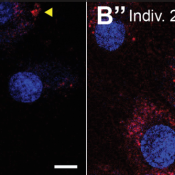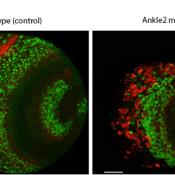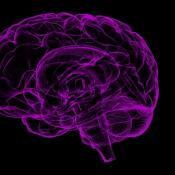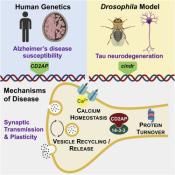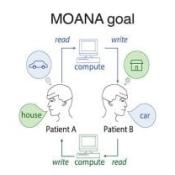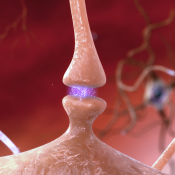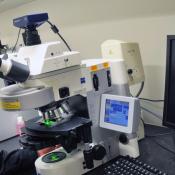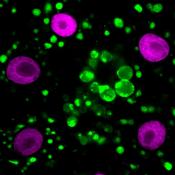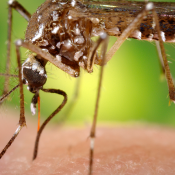Research Breakthroughs
New insight on ACOX1-related neurodegenerative disorders
3/12/20A study from the Bellen lab in Neuron uncovers a novel neurological disorder that is caused due to hyperactive ACOX1 and finds ways to treat this and other ACOX1-related disorder.
Xue lab develops animal models for STXBP1 encephalopathy
2/19/20A study from Xue lab develops new tools to advance research in STXBP1 encephalopathy.
Fruit fly screen uncovers genes regulating peroxisomal disorders
1/16/20A study from Wangler lab identifies 18 genes that regulate peroxisomes and may be invovled in peroxisomal disorders.
Link between herpes virus infections, Alzheimer’s refuted
1/7/20A study published in Neuron from Dr. Zhandong Liu's lab provides statistical evidence that refutes the link between increased levels of herpes virus infections and Alzheimer's disease. Moreover, the study provides a framework and guidelines for big data analysis.
ACTG2 variants discovered as a reliable diagnostic marker and prognostic tool for visceral myopathy
1/7/20A study from the Wangler lab published in Human Mutation identifies ACTG2 gene as the primary determinant of severe symptoms and worse long-term prognosis in majority of patients with visceral myopathy.
Loss of OXR1 causes lysosomal dysfunction and a novel neurodevelopmental disorder
11/28/19A collaborative study identifies a new neurodevelopmental syndrome due to the lysosomal dysfunction in the absence of OXR1.
Study reveals how maternal Zika virus infection results in microcephaly among newborns
11/14/19Bellen lab discover that a Zika virus protein (NS4A) disrupts brain growth by hijacking the ANKLE2 and VRK1 -mediated neurogenesis pathway, which opens up the exciting possibility of developing VRK1 kinase inhibitors as therapeutic targets for microcephaly, particularly for congenital Zika syndrome.
Researchers discover new intellectual disability syndrome
10/10/19A collaborative study from the Bellen lab finds mutations in IQSEC1 resposible for a new intellectual disability syndrome.
Tau-mediated RNA splicing errors linked to Alzheimer’s
10/9/19Researchers in Shulman and Liu labs show tau-mediated aggregates sequesters core components of the spliceosome complex leading to dgeneration and loss of neurons in the brains of Alzheimer's patients.
Meningioma molecular profile can predict tumor recurrence
10/8/19New study shows molecular profiling can predict the recurrence of meningiomas better than current histopathological calssifications.
Loss of ataxin-1 gene linked to Alzheimer’s disease risk
8/23/19A Cell paper published from the Zoghbi and Tanzi labs shows loss of ataxin-1 gene, which is known to cause the rare neurodegenerative disease called spinocerebellar ataxia type 1 (SCA1), function can increase the risk of Alzheimer’s disease in a mouse model of the condition.
Gene linked to Alzheimer's disease is involved in neuronal communication
8/14/19Shulman et al. identify the mechanism by which mutations in CD2AP/cindr increases susceptibility to Alzheimer's disease.
Collaborative research initiative reveals a novel neurological syndrome
7/19/19UDN links WDR37 gene to a novel neurological syndrome.
Afraid of food? The answer may be in the basal forebrain
6/17/19Arenkiel lab has identified a novel basal forebrain circuit that controls feedling behaviors.
McGinley and Arenkiel involved in an exciting DARPA-funded project
5/21/19NRI researchers participate in an exciting DARPA-funded project.
New computational tool improves gene identification
5/9/19Like finding a needle in a haystack, identifying genes that are involved in particular diseases can be an arduous and time consuming process. Looking to improve this process, a team led by researchers at Baylor College of Medicine has developed a new bioinformatics tool that analyzes CRISPR pooled screen data and identifies candidates for potentially relevant genes with greater sensitivity and accuracy than other existing methods. The new analytical web-based tool also is quicker and more user friendly as it does not require bioinformatics training to use it.
SHANK3: the good, the bad and the hopeful
3/7/19Some neuropsychiatric conditions may boil down to how well brain cells communicate with each other. This can be affected by a number of factors, including having too much or too little of proteins that function at the synapse – the point of communication between two brain cells. SHANK3 is one of these proteins. In their labs, Dr. Huda Zoghbi, Dr. Jimmy L. Holder Jr. and their colleagues have been extensively studying SHANK3, and they and other labs have discovered what is good, bad and hopeful about this protein.
Discovery improves understanding of Lou Gehrig's disease
2/26/19A study from Dr. Hugo Bellen's lab shows how ubiquilin proteins regulate lysosomal function, which suggests potential therapies for amyolateral sclerosis and frontotemporal dementia.
Two independent mechanisms are involved in tuberous sclerosis
2/7/19A study from Dr. Marco Sardiello's lab finds development of tuberous sclerosis involves a second mTORC1-independent mechanism.
New insights into Zika's microcephaly link, similarity to dengue
12/13/18A collaborative study from the Bellen lab provides new insights into how dengue and Zika viruses cause disease reveal shared and virus-specific mechanisms.





